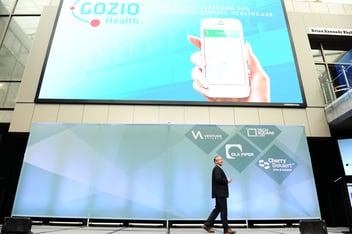Indoor Positioning Momentum
This will be the year people say that indoor positioning really got rolling.
Of course we all know that it’s been quietly gathering steam, and we’ve made great progress here at Gozio, but now the media is latching onto IPS as a story, and things are getting interesting.
As expected, big players are doing demos of what’s possible. This will drive all sorts of awesome products into the world.
CES started this week and we expect there to be a lot of interesting news from the show. At the end of this post is a link to a story where they will be using Apple’s iBeacons for an indoor scavenger hunt. They way they are doing it is excellent – the feature is embedded in the CES mobile app. People can hunt down the badges and collect them and win prizes.
You can also see how the language and applications of indoor positioning are evolving. It’s referred to in the press release as “proximity awareness.” This is going to be a big area of interest for the next few years.
GPS is knowing where you are outside.
IPS is knowing where you are inside.
And “proximity awareness” is companies knowing that you know where you are inside and letting you know that they know that you know it. And helping you find stuff.
The idea is that they will be able to do what we at Gozio call “micromarketing.” (Yes, you heard that term here first. Either Gozio maintains a deep staff of highly qualified etymologists and linguists whose sole function is to research and develop new words, or our blogger makes them up and verifies them as new due to their being underlined red in his word processor. We’ll never reveal the truth.)
A big part of marketing is what’s called, “awareness.” It’s what we as regular people think of as advertising. Are you aware of that company’s products and brand? Of course, because of the advertising.
Well, micro-marketing enables firms to do more than target a single person. We’ve had that for a long time – direct mail was the start of it. The internet and our mobile devices are the latest example. Instead of broadcasting the message to large groups of people hoping that applicable individuals see it and take action, micromarketing enables a company to reach a specific individual in a specific physical location.
Today The Gap can send you a targeted message via Twitter or Facebook, or they can email you. But what if you are at the froyo shop torn between low-fat and no-fat chocolate? You can’t buy jeans at that time or location, you’re busy with yogurt.
But what if they could reach you when you were in their store?
You’ll see more and more of this as the technology evolves and is experimented with. It’s coming fast in retail – pretty soon when you’re looking at sweaters – ding! – you will receive a notification that you can have 5% off a sweater. And then when you walk a few feet over the the jeans section – ding! – a coupon for jeans.
They can make you “aware” of things in the store, lead you to different parts of the store, and even ask you a few questions and then guide you around to assemble an entire outfit – from shirt to pants to shoes.
This ability to micromarket to people means that in addition to your “preference” profile (your buying history and things you seem interested in based on browser behavior) you can also have a location profile – when you are in the right place, the right preferences can be addressed.
Obviously this extends beyond the clothing store. Expect to see this sort of thing in all the shopping malls and big box retailers. Gone are the days of looking at those signs way up high at the end of the aisle at places like Home Depot and Lowe’s. Instead, you’ll type “rainbird sprinkler head” into your app and it’ll take you directly to the shelf where you can find the parts you need. (It will not help you remember if you need to 90 or 180 degree head – so you will still probably end up buying both just to be sure.)
Here’s the link to the press release about the CES scavenger hunt:
Thanks for reading, and as you explore the great indoors, always think of Gozio.
Photo: Ingo Mehling

